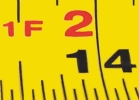Learn why a tape measure has numbers in two colors.
Buy This Article Now!
 Why does my tape measure have numbers in two colors? Why does my tape measure have numbers in two colors?
 The short answer is that the two colors provide a quick visual of the measurement and allow you to quickly orient yourself to the measurement. The short answer is that the two colors provide a quick visual of the measurement and allow you to quickly orient yourself to the measurement.
 When reading either the upper or lower scales in 1/16-inch increments, the readings are shown as 1/16, 1/8, 3/16, 1/4, 5/16, 3/8, 7/16, 1/2, 9/16, 5/8, 11/16, 3/4, 13/16, 7/8, 15/16, and 1-inch as illustrated in the drawing to the right. After the 1-foot mark, some blades display the inch numbers in black on the bottom scale and in red numbers on the top scale. When reading either the upper or lower scales in 1/16-inch increments, the readings are shown as 1/16, 1/8, 3/16, 1/4, 5/16, 3/8, 7/16, 1/2, 9/16, 5/8, 11/16, 3/4, 13/16, 7/8, 15/16, and 1-inch as illustrated in the drawing to the right. After the 1-foot mark, some blades display the inch numbers in black on the bottom scale and in red numbers on the top scale.
 The red inch numbers work in conjunction with the foot numbers, so
when you look at the tape measure blade (right), you would read the measurements as 1' 1", 1' 2", 1' 3", and so on. The image below displays 14" as the inch number on the bottom scale while the top scale displays 1' 2". If you add the top scale numbers together, it will equal the number displayed on the bottom scale. So if you add together 1' (12") and 2", you get 14". No matter what top scale numbers you add together after the 1-foot mark, it will equal the bottom corresponding scale number. This holds true for the full length of the tape measure's blade. The red inch numbers work in conjunction with the foot numbers, so
when you look at the tape measure blade (right), you would read the measurements as 1' 1", 1' 2", 1' 3", and so on. The image below displays 14" as the inch number on the bottom scale while the top scale displays 1' 2". If you add the top scale numbers together, it will equal the number displayed on the bottom scale. So if you add together 1' (12") and 2", you get 14". No matter what top scale numbers you add together after the 1-foot mark, it will equal the bottom corresponding scale number. This holds true for the full length of the tape measure's blade.
|
Learning why a tape measure uses numbers in different colors is only a small part of using a tape measure effectively.
To really learn the ins and outs of reading a tape measure and to gain insights into choosing the best one for you, consider purchasing my award-winning article, "Learn How to Read and Choose a Tape Measure." This article received the 2008 Vaughan/National Association of Home and Workshop Writers (NAHWW) Golden Hammer Writing Award in the Internet Category.
Available in both .pdf and hard copy, this 8-page article features 21 color photographs and provides outstanding information about using a tape measure to its full potential and purchasing a quality tape measure.
Click here to read customers' feedback. To purchase "Learn How to Read and Choose a Tape Measure," click here!
|
Copyright ©
2008 LAF/C.R.S., Inc. All rights reserved.
Question answered by Leon A. Frechette.
[ Back to Top ]
|


